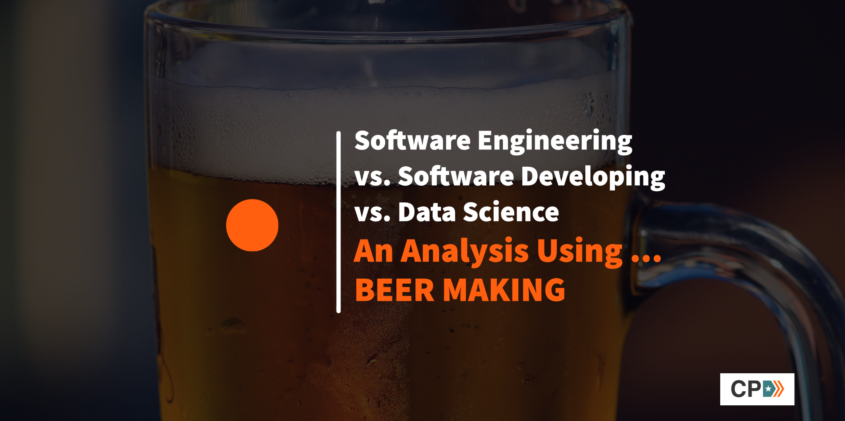Software Engineering vs. Software Developing vs. Data Science: an Analysis Using…Beer Making.
We get many questions at Code Platoon about the terms used in the title of this article, often specifically related to whether or not we offer classes in those particular fields. But because we strive to address these inquiries in the most thorough way possible, it only makes sense to provide answers via the military and Veteran community’s favorite cool, refreshing drink.
Beer.
Why beer, you ask? Well, I’m glad you did because you just outed yourself as an imposter. After all, no one in the military or Veteran community would question the power of beer.
Report yourself as a spy, and may they have mercy upon you.
For those who passed, let’s move forward. First, it is important to recognize that many terms get used interchangeably due to the nature of the world of technology. So it could very well be the case that someone is using words like “engineering” and “developing” to mean the same thing—like using “lager” and “beer,” for example.
But we can dig into each of these terms using the Brewmeister construct to understand them a bit better to make a more informed decision about which path is right for you.
Let’s start by imagining a relatively wealthy friend of yours who wants to craft a new beer. He employs you, the developer, to first figure out what tastes good to him and determine the style and platform of delivery.
Does he want a lager, an ale, or a stout, and what should the alcohol content be? And what subtype within one of those styles most suits his taste? Dry Irish, Imperial, Coffee, and Milk are all types of stouts, so figuring out the nuances of each according to desires and needs all fall under the purview of a developer’s role.
Note that we’ve already gone beyond the typical military desires of “cold” and “a lot” for descriptors, so more technical knowledge is needed.
Now let’s say that the flavor is dialed in, and the moneyman who sought the new beer is pleased with what was developed but wants to bring it to a larger audience and capitalize on this fresh, great taste you have discovered. It’s time to bring in the engineer.
Does the new brew meet quality standards? Is it consistently flavored between bottles 5 and 500? Can that be maintained for 5,000 more, and does that consistency meet all legal, safety, and ethical requirements for consumer protection purposes?
These are all areas of focus for the engineer, whose job is to ensure these standards are met—and met consistently.
But what if your wealthy friend wants to take your new brand to a truly unique level? Then you will need to understand how it is received across a bigger and broader spectrum.
In taste tests, how well is received by people when compared to other brands? And is there a way we can break this down by demographics—for example, does your new beer resonate more with officers or enlisted personnel? Does the likability skew more towards younger or older consumers? Male or female? Does the brand imagery hold more appeal to one group over another, or is it attractive across a broader spectrum?
To make sense of all these answers, including collecting them and categorizing them—you’ll need to employ a data scientist. It is their job to extrapolate and understand the facts about what the product does and to whom.
Bringing this analogy back to its original purpose (as if there were a bigger purpose than beer!), we can see how this applies to the software by merely replacing “new beer” with “new app” or “new software.” In light of that, it is easy to see how development and engineering have a lot of overlap, but the data scientist is in a bit of a different category.
Code Platoon offers a full-stack curriculum that gives students the fundamental understanding of code writing that will form a foundation for either software development or software engineering—they can come up with a style of beer out of thin air, or they can make a new beer more consistent and palatable to a broader audience. And although this will help create tools to assist in the data analysis process, that field is moving more into the arena of statistics and statistical evaluation.
If you are wondering why Code Platoon does not offer classes in data science, the answer is simply that our focus is on a full-stack curriculum geared towards software and coding. Our suggestion to those interested in data science in addition to what we do is to take a class or two on statistics and statistical analysis and pair that with the knowledge of Python you’ll learn at Code Platoon (data scientists tend to use Python). Economics and business analytics-themed courses would be a great addition to what a full-stack curriculum has brought you.
Only you can decide which is the right path for you, of course. Understanding that these skills do somewhat overlap and understanding the code that underlies all of it will do nothing but help in any area.
To put it in the theme of the current topic, beer creators can also compare with others how their brew tastes, and there is nothing to stop them from learning how to analyze how other people react to it. Because who doesn’t like a well-rounded approach to that classic libation?
Greg Drobny is a former Airborne Infantryman, PSYOP Team Chief, political consultant, professional mil blogger, and is Code Platoon’s Student Outreach Coordinator. He holds a BA in history, a Masters of Science in organizational psychology and is currently pursuing an MA in history. He is married with four children who keep him more than slightly busy and is passionate about helping Veterans find their paths in life and develop the skills needed to pursue their goals.

